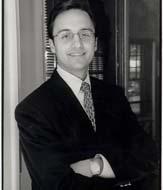The HCFO program ended in December 2016.
This site will no longer be updated, and some elements may not appear correctly.
Anthony Lo Sasso, Ph.D

Anthony Lo Sasso, Ph.D., is associate professor and senior research scientist in the Health Policy and Administration Division of the School of Public Health at The University of Illinois - Chicago. An economist and applied econometrician, Dr. Lo Sasso's research interests include the health care safety net and other health care policy initiatives; work place health benefits; and economic aspects of mental health and substance abuse. In 2005, Lo Sasso and co-author Tom Buchmueller, Ph.D. received AcademyHealth's Article-of-the-Year Award for their work on the effect of SCHIP on public and private insurance coverage. He recently completed a five-year Independent Scientist Award from the Agency of Healthcare Research and Quality studying workplace health benefits and their affect on employee health.
Lo Sasso received his B.A. and M.A. in economics from DePaul University and his Ph.D in economics from Indiana University.
In March of 2001, Lo Sasso received a HCFO grant to examine the relationship between the safety net (i.e. hospitals and federally qualified health centers) and employer provided health insurance. Specifically, his research focused on how the structure and characteristics of the safety net affect employees' decisions to accept coverage for themselves and their families and employers' decisions to offer it. The researchers compiled data using the March Current Population Survey Annual Demographic File from 1990-2000 and information on uncompensated care reported in the American Hospital Association's annual survey of hospitals and administrative data on Federally Qualified Health Centers as reported to the Bureau of Primary Health Care. These detailed measures on individual health insurance coverage and health care facilities were used to investigate the link between coverage and safety-net characteristics over an 11-year period.
Findings indicate that safety net services "crowd out" private health insurance for childless adults with access to good safety-net services. The extent of this crowd out appears mixed, however, with hospital uncompensated care largely unrelated to health insurance coverage and health center uncompensated care associated with relatively small "crowd out." For children under the age of 14, there is only weak evidence that the safety net affects take-up of private insurance. Lo Sasso explains "the research is noteworthy because, in contrary to some previous research, we do not find evidence of large crowd-out associated with safety net health care services. This suggests that government support of the health care safety net may represent a minimally distortive means of improving health for low-income individuals."
For more information on Anthony Lo Sasso, Ph.D., and a list of selected publications please see: www.cade.uic.edu/sphapps/faculty_profile/facultyprofile.asp
